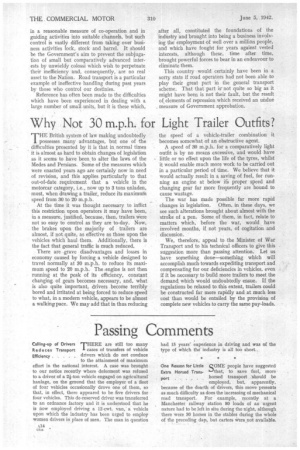Why Not 30 m.p.h. for Light Trailer Outfits?
Page 16

If you've noticed an error in this article please click here to report it so we can fix it.
THE British system of law making undoubtedly possesses many advantages, but one of the difficulties presented by it is that in normal times it is almost as hard to obtain changes of legislation as it seems to have been to alter the laws of the Medes and Persians. Some of the measures which Were enacted years ago are certainly now in need of revision, and this applies particularly to that out-of-date requirement that a vehicle in the motorcar category, i.e., now up to 3 tons unladen, must, when drawing a trailer, reduce its maximum speed from 30 to 20 m.p.h.
At the time it was thought necessary to inflict this restriction upon operators it may have been, in a measure, justified, because, then, trailers were not so easy to control as they are to-day. Now, the brakes upon the majority of trailers are almost, if not quite, as effective as those upon the vehicles which haul them. Additionally, there is the fact that general traffic is much reduced, There are grave disadvantages and losses in economy caused by forcing a vehicle designed to travel normally at 30 m.p.h. to reduce its maximum speed to 20 m.p.h. The .engine is not then running at the peak of its efficiency, constant changing of gears becomes necessary, and, what is also quite important, drivers become terribly bored and irritated at being forced to reduce speed to what, in a modern vehicle, appears to be almost a walking pace. We may add that in thus reducing the speed of a vehicle-trailer combination it becomes somewhat of an obstructive agent. A speed of 30 m.p.h. for a comparatively light outfit is by no means excessive, and would have little or no effect upon the life of the tyres, whilst it would enable much more work to be carried out in a particular period of time. We believe that it would actually result in a saving of fuel, for running an engine at below ifs proper speed and changing gear far more frequently are bound to cause wastage.
• The war has made possible far more rapid changes in legislation. Often, in these days, we see such alterations brought about almost with the stroke of a pen. Some of them, in fact, relate to matters which, before the war, would have involved months, if not years, of cogitation and discussion.
We, therefore, appeal to the Minister of War Transport and to his technical officers to give this suggestion more than passing attention. Let us have something done—something which will accomplish much towards expediting transport and compensating for our deficiencies in vehicles, even if it be necessary to build more trailers to meet the demand which would undoubtedly ensue. If the regulations be relaxed to this extent, trailers could be constructed far more rapidly and at much less cost than would be entailed by the provision of complete new vehicles to carry the same pay-loads.




















































